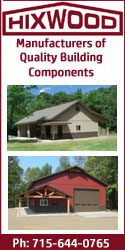 |
 |

|
|
|
Pennsylvania Ag News Headlines |
 |
Extension: Slight Risk of Spotted Lanternfly on Christmas Trees
Pennsylvania Ag Connection - 11/21/2018
There is nothing quite like the splendor of a live Christmas tree to bring the beauty and amazing scents of the outdoors into homes for the holidays.
This year, however, some folks in southeastern Pennsylvania are wondering if their favorite evergreen tree might also bring with it a not-so-festive ornament -- a spotted lanternfly egg mass.
Real Christmas tree traditionalists need not worry, according to a Penn State Extension educator, who says that the likelihood of that happening is the same as the Grinch stealing the roast beast. Well, almost.
"Real trees are part of an outdoor ecosystem, and there is always a chance that insects may be brought indoors with a tree, and the spotted lanternfly is no exception," said Tanner Delvalle, a horticulture extension educator based in Berks and Schuylkill counties.
"However, the risk is small and should not be a reason for anyone to forego having a live holiday tree."
To further quell concerns, Delvalle said that Christmas tree growers follow integrated pest management practices to minimize such threats. And, in the case of the spotted lanternfly, growers in the quarantine zone of Berks, Bucks, Carbon, Chester, Delaware,
Lancaster, Lebanon, Lehigh, Monroe, Montgomery, Northampton, Philadelphia and Schuylkill counties work with the Pennsylvania Department of Agriculture to meet the spotted lanternfly quarantine requirements prior to the sale of Christmas trees.
Still, consumers can take a proactive role by inspecting a tree for spotted lanternfly egg masses prior to purchase. Egg masses, which resemble gray mud splatters, easily can be scraped from tree bark. Delvalle recommends destroying removed egg masses by
placing them in a container filled with rubbing alcohol or hand sanitizer. While this is the most effective way to kill the eggs, he pointed out that they also can be smashed or burned.
And, if by small chance, an egg mass is present on a tree and hatches indoors, the nymphs pose no threat to humans or animals and will die quickly, Delvalle noted.
After the holidays are over, he advises, those living in the quarantine zone should take their trees to recycling programs where they will be chipped and composted or burned and not transported out of the quarantine zone.
"Overall, the benefits of having a live tree outweigh any risks associated with pests," said Delvalle, who pointed out that Pennsylvania is the fourth largest Christmas tree-producing state, with annual sales of more than $22 million.
"Purchasing real Christmas trees benefits local growers and the local economy," Delvalle said.
He added that live trees also are an environmentally friendly choice, as they are a renewable resource and can be recycled easily, unlike artificial trees.
Tips on how to choose and care for a Christmas tree can be found on the Penn State Extension website at https://bit.ly/2ORNfoE. Current and comprehensive information on spotted lanternfly and management options are available at
extension.psu.edu/spotted-lanternfly or by calling 1-888-4BADFLY.
Other Pennsylvania Headlines
|
|
 |


|
 |
|
Copyright © 2024 - Farms.com. All Rights Reserved. |
 |
|